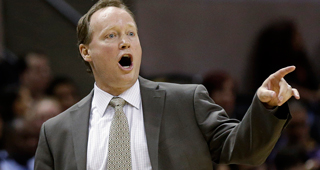The Atlanta Hawks extended their playoff appearance streak to a ninth straight in 2015-16. They fell off by 12 wins from the previous year that saw them unexpectedly land at the top of the Eastern Conference. The drop off had the Hawks questioning the long-term core of the roster for the first time. The Hawks considered trades for Jeff Teague, Al Horford, Kyle Korver and Dennis Schroder. Ultimately, Atlanta chose not to deal any of their core, made the playoffs and were eliminated in the second round, once again at the hands of the Cavaliers.
Of the core group, their health was remarkable with Paul Millsap, Teague, Horford and Korver combining to miss only five games. The emergence of some younger players allowed Mike Budenholzer to manage minutes for his starters; especially Jeff Teague who played his fewest MPG since he became a starter. The Hawks' only serious injury was to Tiago Splitter, who missed the majority of the season with a hip injury that will also keep him out of the Olympics this summer.
Unfortunately when health is one of the best points of your season, you might not have had much of a season. This isn’t entirely true, but the Hawks were down from the previous year, which happened to be arguably the best in recent franchise history. The biggest drop off was offensively. Teague and Korver were noticeably less efficient and combined with slight drops for Millsap and Horford, the Hawks offense fell off. They were still good, but not historically good like the previous year.
The drop in efficiency paired with the drop in the standings, is what has caused Atlanta to consider starting a rebuild. Teague is almost 28 years old and has only year left on his contract. Recent rumors have the Hawks and 76ers discussing a deal centered around Teague for Nerlens Noel. While, Noel is far from a perfect fit for what Budenholzer wants (shooting from all five positions), he would be tremendous value for an expiring PG who is starting to age a bit.
Adding to the intrigue with Teague is the emergence of Dennis Schroder. Schroder has proven to be a high level backup and is deserving of an opportunity to start and run his own team. He’s also eligible for an extension this summer. Essentially, the Hawks may be looking at making a choice between Teague and Schroder as to who may be the long term starter at the point guard position.
As for Korver, after leading the league for two straight years in three point shooting, he dropped almost 10%. Shooting almost 40% from three is still excellent for most players, but Korver has established such a high ceiling it feels like a major slip for him. He also just turned 35, so questioning whether or not this is a sign of a permanent decline is fair. Korver’s contract expires after this season as well, so his long-term future on the roster is also in question.
Paul Millsap joins Teague and Korver as a player who could be entering his final year in Atlanta. He has two years left on his contract, but the final year is a player option that he almost assuredly will decline. An All-Star each of his first three years with the Hawks, Millsap continues to be effective as an inside-outside threat and a solid defender. He was very close to signing with Orlando prior to re-upping in Atlanta, so he’ll be a desirable target either as a free agent a year from now or on the trade market this summer.
The final member of the core group, Al Horford, has already reached free agency this summer. In an offseason with few marquee free agents and so much available money, Horford is almost certain to get multiple maximum contract offers. The number of years can be debated, but for a player who is very good on both ends, and has added a three-point shot to his game, Horford is worth the max. Atlanta would ideally like him back, but if they choose to rebuild, it won’t make sense to extend him a big offer given he is starting to age out of his prime years. The direction the team takes with Horford may be in the single biggest indicator of how they choose to proceed for the rest of the offseason.
At this time last year, the Hawks were hoping to retain DeMarre Carroll despite lacking Bird Rights and being limited in what they could pay him. Carroll ultimately cashed in on his success in Atlanta by signing with Toronto. Yet the Hawks find themselves in the same situation this summer with Kent Bazemore. Like Carroll, Bazemore flourished on both ends in the Atlanta system. Also, like Carroll, Bazemore was signed to a short deal after middling success with his previous teams. While worth the gamble, it puts the team in a tricky situation come free agency. If the player develops and proves worthy of a hefty raise, you don’t have Bird Rights, so you are limited in what you can pay without using pure cap space. Much like with Carroll and Millsap’s free agency last offseason, the Hawks will have to weigh re-signing Bazemore against an offer for Horford this summer.
Atlanta’s other free agents are largely inconsequential. The team would probably like to have Kris Humphries back as a depth piece, but they won’t extend themselves very far to do so. Kirk Hinrich seems likely to move on, as he rarely played after being acquired from Chicago at the trade deadline and generally seems near the end of his career. Mike Muscala is the other potential free agent, and it is a virtual lock that the Hawks will exercise their team option to keep him as part of the fold. He’s been productive as a reserve big and his contract contains a very small guaranteed amount.
Beyond that, the Hawks' biggest decision is if they should guarantee Mike Scott or not. Scott’s $3.33 million dollar deal becomes fully guaranteed on 7/10. His recent legal woes don’t bode well for him and may be enough to offset his production as a reserve. If Atlanta is bringing back their core players, they will likely bring Scott back as well. If they move in a younger direction, it may make sense to move on from Scott and free up the extra space this summer to be spent elsewhere.
Projecting who might be good free agent targets for Atlanta is hard without knowing their exact direction. If they deal Teague for Noel (or a similar type of deal), you would think they would want to keep Korver for the shooting he provides. And does that make it less likely Horford returns, thus freeing up money for Bazemore? If they bring back Horford and keep Teague, Korver and Millsap, who do the Hawks target to replace Bazemore, as they won’t have the space for him too? There isn’t a viable in-house replacement on the roster so cheaper options like O.J. Mayo, Kevin Martin, Matt Barnes, or Chase Budinger could make sense. They could also roll back their strategy of a short term offer to an undervalued player like Solomon Hill or Lance Thomas and see if they can blossom like Carroll and Bazemore.
With so many players’ status up in the air, this summer will go a long way in deciding the future of the Hawks. They’ve had a great run with this group and you can’t blame them if they want to run it back for one more. They’ll have plenty of cap room again in the summer of 2017, so the best route may be to give it one more year and see what happens. They’ll always be able to find a trade for their players in season if necessary. Or they can pull that trigger now and start building around Schroder and a player like Noel. Either way, this offseason will be fascinating for Atlanta, and if rumors are to be believed, potentially starting sooner rather than later.
Offseason Details
Guaranteed Contracts (8): Tim Hardaway Jr., Kyle Korver, Paul Millsap, Dennis Schroder, Thabo Sefolosha, Tiago Splitter, Walter Tavares, Jeff Teague
Partial/Non-Guaranteed Contracts (2): Lamar Patterson, Mike Scott
Potential Free Agents (5): Kent Bazemore (UFA), Kirk Hinrich (UFA), Al Horford (UFA), Kris Humphries (UFA), Mike Muscala (UFA – Team Option)
“Dead” Money on Cap (0): None
First Round Draft Picks: # 21
Maximum Cap Space: $38,124,459
Projected Cap Space: $12,024,877



